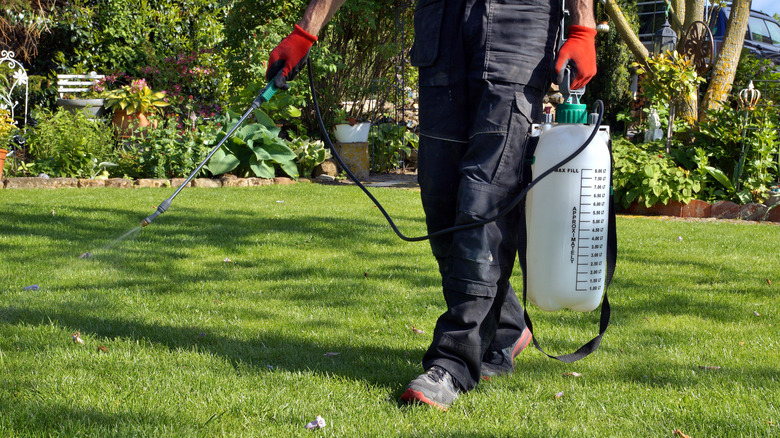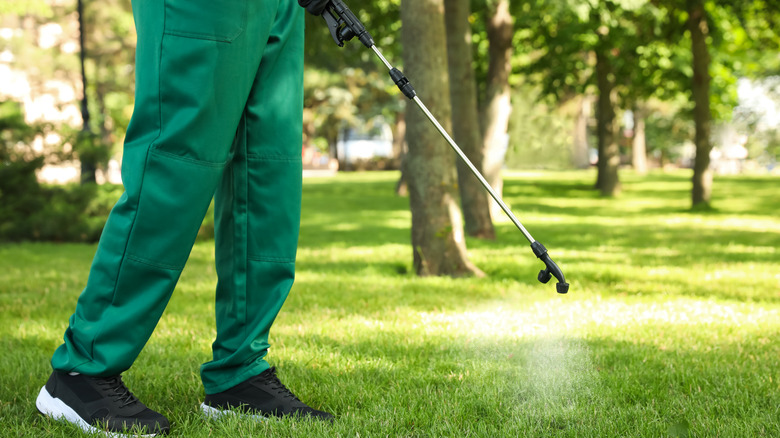How And When To Spray Your Yard For Ticks
As the weather warms up and the sun comes out, so too do insects and other pests that carry disease. Ticks, in particular, pose a serious threat to both humans and pets due to their ability to transmit serious diseases such as Lyme disease.
While it's often thought that ticks are only a concern if you're trekking through the woods, the reality is that ticks simply like hanging out in grassy, shaded areas – much like your own yard. Even if you regularly mow and manicure your lawn, ticks can still easily find a home toward the outer edges in brush, leaves, or other vegetation cover.
Spraying your yard for ticks can prevent them from inhabiting your yard and kill the ones that already managed to sneak in. Understanding when and how to best spray your yard to repel and eliminate ticks can help you and your family safely enjoy the outdoors this summer.
Using chemical pesticides to spray for ticks
There are many chemical pesticides on the market that are proven effective in the fight against ticks. Acaricides are a class of pesticides that are designed to kill ticks and prevent them from inhabiting your yard. Because these pesticides are highly toxic and potentially dangerous, the CDC recommends checking with local officials regarding any environmental restrictions pertaining to using them, in addition to considering hiring a professional pesticide company to do the work for you.
Broad-spectrum insecticides such as permethrin are also effective at preventing and eliminating ticks. These insecticides are often sold in a concentrated form that is mixed with water. Follow the instructions on the bottle for specific ratios and instructions on how to use it. Permethrin SFR, a popular tick treatment, calls for 1 and ⅔ fl. oz of concentrate to one gallon of water for every 1,000 sq. ft that you want to treat. Wear protective clothing when spraying any chemicals, and wait for the area to completely dry before coming into contact with it or allowing pets to do so.
To minimize the amount of harsh chemicals you are introducing into the environment, focus on spraying the perimeter of your yard as opposed to the entirety of it. After all, 80% of ticks in your yard will be found within nine feet of the perimeter. Not only does focusing on the outer nine feet of your property help prevent you from unnecessarily using more toxins than you need to, but it also allows you to focus your attention on preventing ticks from crossing that barrier and entering your yard in the first place.
Non-toxic alternatives for tick elimination
While many traditional methods of tick elimination through the use of chemicals and pesticides have been proven effective, many have also proven to be bad for you, your pets, and the environment. Luckily, there are several home remedies you can try that are tough on ticks while still being safe to use around your family –- both human and furry.
Cedarwood oil spray is a natural, non-toxic tick repellent that you can use in your yard in place of dangerous pesticides. In fact, straight-up cedarwood oil is so natural that you can safely spray it directly onto your skin and clothing and use it as a personal tick repellent –- one so strong that a study found its effects on ticks to be similar to that of DEET. Though you can buy cedarwood oil yard spray in most garden centers, you can also just as easily make your own by mixing one to two tablespoons of cedarwood oil per every cup of water. Continue to spray the mixture around the perimeter of your yard every few weeks, or more commonly if your property is prone to ticks.
If ticks have made their way into your yard, eucalyptus oil or neem oil can be used to kill them on contact. In a pinch, combine four ounces of water with 30 drops of oil in a spray bottle and shake it well before using it to eliminate ticks.
When is the best time to spray your yard for ticks?
The best time to spray your yard for ticks is before they have a chance to populate it. In most places, this means in the spring, before eggs laid by adult ticks hatch but after the snow has melted and the ground is dry. Though treatment is usually recommended beginning in the spring, it's most effective if you continue to spray your yard throughout the calendar year into the fall. Spraying for ticks throughout the entirety of their lifespan helps kill any that get a chance to hatch and prevents them from laying eggs of their own and continuing the life cycle.
During colder temperatures, ticks seek shelter and warmth in leaves and brush close to the ground. Spraying your yard for ticks in the spring helps kill any that survived the winter and remained dormant, while also helping to kill any eggs that they had a chance to lay in their winter shelter.



